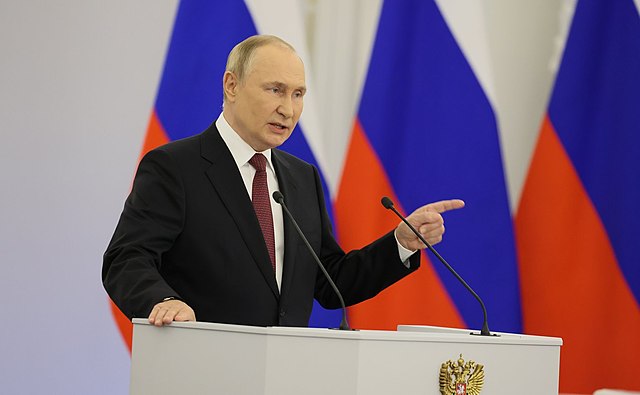Top-down nationalism: Russia turns to terrorism propaganda

Putin at a 2022 speech on the annexation of various regions to Russia
Morgan Aikele- Ever since the beginning of the war in Ukraine, Vladimir Putin and other Russian officials have sought to control the narrative. The unofficial campaign to justify the invasion, particularly to Russians, initially focused on painting Ukrainians as Nazis. However, Russian officials have had to continually adapt their narrative as the war trudges on. Most recently, Russian media and officials have employed top-down nationalism to depict Ukraine as a terrorist threat— one which Russia must nobly resist.
Nationalism creates a shared sense of attachment to a particular nation and emphasizes that every nation has a right to control a particular piece of territory. Top-down nationalism refers to the use of government resources and the media to justify geopolitical actions by appealing to a sense of national identity. Russian officials feel such pressure keenly– in the face of lost ground, piling casualties, and ill-equipped, untrained soldiers joining the front lines, “Russian social media is awash with (these) scenes…in widely circulating videos.” Thus, Vladimir Putin and Russian state media have begun to push back in an attempt to reinvigorate the sense of need for the war by sensationalizing and misrepresenting information to frame Ukraine poorly and Russia nobly. For one, the Kremlin has begun to refer to the war more exclusively as the “people’s war,” further distancing it from Vladimir Putin’s political goals. Putin, who first claimed that Ukrainians are Nazis, now has shifted to unfounded claims that Ukraine is planning a dirty bomb attack, and that there is a vast, concentrated terrorist threat against Russia. These claims have circulated rapidly on social media and on Russian news. Despite a lack of evidence, Putin has used these claims to paint the war as one that Russians must of necessity engage in– an “existential fight to save the country” in the face of terrorism. This latest round of propaganda may be the Kremlin’s most effective yet– since these claims have circulated, there has been a surge in Russians online equating Ukraine’s actions with those of Osama bin Laden. By acting as if a terrorist enemy aims to obliterate Russia, Putin successfully has begun to engage more citizens in a dialogue centered on support for their home country.
Russia’s success in changing the narrative on the war will also be measured in how their material power either increases or decreases. Material power, or the “things” that a country possesses, like a powerful economy or military, are in part dependent on relationships with other countries. If other countries buy into this narrative, we may see increased sales of military weapons to Russia, like North Korea has recently engaged in. Within Russia, we may also see an increased number of citizens interested in joining the war effort on the ground level.

